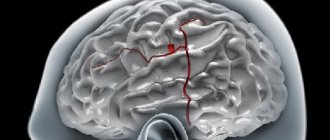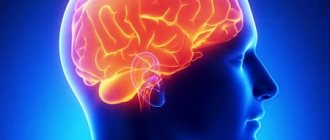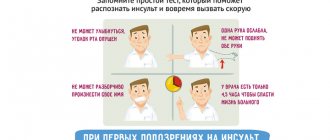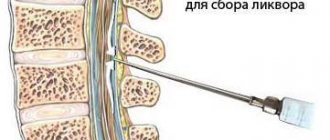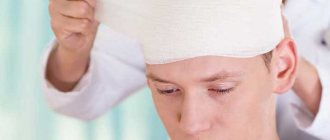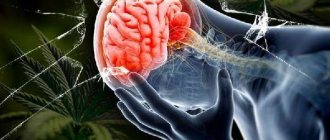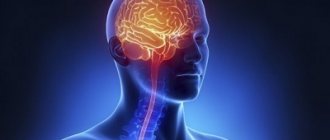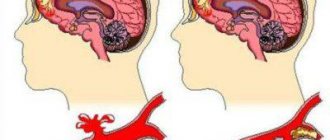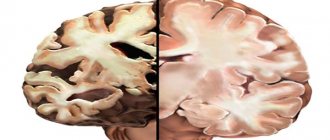Concussion (etymology: comes from the Latin “commotio”) is the mildest of all types of brain (and skull) injury, occurring without (macroscopically) visible disruption of the brain structure, manifested by impaired brain function and decreased performance.
The most common cause of concussion is a fall - most often in winter when there is ice - and a blow to the head, domestic fights, injuries at work, injuries during sports (especially impact sports). Recovery from a concussion is faster and more complete than from concussion and other severe TBI. A concussion requires hospitalization in a neurological or neurosurgical hospital.
Clinical picture
The following features are characteristic of SGM:
- short-term depression of consciousness (stunning or stupor lasting several minutes, and sometimes seconds);
- amnesia for a short period of time;
- nausea, single vomiting;
- increased blood pressure;
- increased breathing and heart rate;
- pallor of the skin, which is replaced by hyperemia;
- dizziness, headache, tinnitus after regaining consciousness;
- insomnia;
- general weakness, sweating;
- pain when moving the eyeballs, their divergence when trying to read something;
- dilation or constriction of both pupils;
- asymmetry of tendon reflexes;
- fine horizontal nystagmus;
- mild meningeal symptoms (disappear within a week).
The general condition improves quickly, after 1-3 weeks only asthenic phenomena remain. Sometimes the headache or other symptoms last longer.
Loss of consciousness and other neurological symptoms are caused by disintegration of nervous activity, disruption of interaction between the cerebral cortex and its other structures.
First aid and consequences of injury
After the impact, the brain tissue is shaken, which leads to the following consequences:
- changes in the physical and chemical properties of the cells that make up the brain;
- temporary disconnection of connections between neurons, which leads to the development of functional and cognitive disorders;
- absence of pathological changes in brain tissue.
Consequences of a concussion
A moderate concussion causes short-term memory loss. The person does not remember what happened to him a few minutes before the events that caused the shell shock. With a severe concussion, a person always loses memory. Moreover, the duration of amnesia is individual in each case. The patient may forget several minutes or even days preceding the injury.
Brain disorders that occur as a result of head injury also include the following:
- temporary disorientation in space;
- incoherent, slurred, or slurred speech;
- impaired concentration;
- difficulty making judgments and performing normal activities.
If the conditions for rehabilitation after a concussion are met, a person’s condition can recover within a few days. In difficult situations, the duration of treatment directly depends on the nature of the complications.
In medical practice, it is customary to highlight long-term consequences. They occur 1-30 years after head injury. These include:
- vegetative-vascular dystonia, characterized by impaired vascular function;
- cognitive impairment;
- emotional disorders (depression, aggression and others);
- post-traumatic vestibulopathy, which is characterized by disruption of the vestibular apparatus.
Frequent concussions can cause the development of:
- dementia;
- depression that does not disappear throughout life;
- Parkinson's disease;
- tremors of the limbs;
- inappropriate behavior not against the background of chronic traumatic encephalopathy.
To avoid these consequences, it is extremely important to properly provide first aid if you suspect a concussion. First of all, you need to call a doctor. Then the following activities are performed:
- Place the victim on a hard surface. The head should be slightly raised. If a person has lost consciousness, he must be placed on his side.
- Open the windows in the room, loosen your tie and other items of clothing that interfere with the normal flow of oxygen.
- Apply a cold compress to your head.
- The patient should not be allowed to sleep for an hour.
SHM in the elderly
In senile and elderly people, the disease has its own characteristics. More often than in young people, loss of consciousness and amnesia, disorientation in space and time occur, and more intense headaches and dizziness occur. Clear focal symptoms may be detected, which may be mistakenly regarded as a more severe pathology. Often after an injury, patients develop an exacerbation of chronic diseases of the heart and blood vessels, diabetes mellitus, etc. Recovery proceeds at a slower pace.
Rehabilitation rules
Before starting any recovery measures, the neurologist must make sure that the patient has a concussion and not a brain contusion or soft tissue hematoma. For this purpose, a number of diagnostic procedures are carried out, for which the victim has to stay in a hospital for some time.
Starting from the first day of recovery after a confirmed concussion, the patient is prescribed a special regimen. He should remain in bed for 1-2 weeks. He is prohibited from experiencing serious physical or mental stress, reading, watching TV, or using various gadgets.
Relaxations in this routine are made with the permission of the attending physician based on test results, taking into account the condition of the victim. The most common cause of a concussion is a fall. This form of TBI is accompanied by dizziness, loss of coordination, and problems with spatial perception. Violating the regimen ahead of time increases the likelihood of the patient receiving another injury.
Most often the injury occurs due to a fall.
Medication assistance
The first weeks of rehabilitation, during which treatment takes place in a hospital setting, are accompanied by a number of uncomfortable sensations for the patient. To combat them, doctors use drugs from various pharmacological groups.
Self-administration of medications that have not been approved by a specialist can aggravate the situation.
Medicines that can be prescribed by a neurologist:
- analgesics – to relieve pain. In rare cases, you even have to resort to narcotic drugs;
- means for strengthening blood vessels - increase the functionality of blood channels, fight hypoxia, normalize blood pressure;
- stimulants of metabolic processes - activate the work of nerve cells, improve the transmission of impulses between neurons;
- nootropics – potentiate higher nervous functions of the brain, eliminate manifestations of hypoxia, improve memory and coordination;
- vitamins and minerals – strengthen the immune system, have a beneficial effect on the state of the central nervous system and the whole body;
- diuretics – remove excess fluid from tissues, relieving cerebral edema or preventing it.
The victim is prescribed medications to strengthen blood vessels.
Continuation of taking the listed products is possible at home. In this case, products, dosages, schedules are also established by the doctor.
Overcoming amnesia
Memory lapses are not uncommon with a concussion. It is noteworthy that amnesia does not often occur unless loss of consciousness has been recorded. Typically, the victim forgets the very fact of the injury and/or the events that preceded it. Less commonly, the problem manifests itself in the inability to remember what happened after the TBI.
To combat the condition, it is necessary to observe medical discipline and apply special recovery techniques. Unfortunately, even with a professional integrated approach, it is rarely possible to completely eliminate the problem.
The basis of therapy is medications. To stimulate memory, the patient is prescribed B vitamins, neuroprotectors and nootropics. Therapeutic hypnosis can have a good effect. To improve the results of the approach, it is recommended to do it in combination with parenteral administration of barbiturates. As an additional technique, color therapy is used - different colors are applied to certain areas of the body.
The basis of patient treatment is medications.
Mental recovery
A concussion in a number of patients is accompanied by disturbances in the emotional background and the development of psycho-emotional disorders. If specialized therapy is not carried out under the supervision of a psychologist or psychiatrist, there is a risk of developing persistent mental disorders.
Problems often manifest themselves as depression, apathy, sleep disturbances due to nightmares, hallucinations, and signs of the victim falling out of reality.
Sometimes such conditions at the start of development are accompanied by unusual symptoms. This may be a decrease in muscle strength, hypothermia, which is replaced by hyperthermia, bad mood or increased sensitivity.
Therapy here requires individual treatment. It includes medication correction with antipsychotics, sessions with a psychologist or psychiatrist, and various techniques aimed at strengthening the psyche. Rehabilitation of this type usually lasts more than one year.
Diagnostics
Recognizing a concussion can be difficult because it primarily presents with subjective symptoms. It is important to take into account the fact of injury and loss of consciousness, often from the words of witnesses to the incident. If the diagnosis is difficult to confirm due to the presence of chronic cerebral pathology in the patient, then the rapid disappearance of symptoms can be informative. The specialist conducts an examination and prescribes further examination to exclude more severe brain damage:
- X-ray (no skull fractures);
- electroencephalography (M-echo is not displaced);
- examination of cerebrospinal fluid (composition unchanged);
- computed tomography (does not detect changes in the substance and ventricles of the brain);
- MRI (does not reveal focal pathology).
What is a concussion and how does it manifest?
By this term, doctors mean damage to the bones or soft tissues of the skull of varying severity. They occur due to household injuries, falls, accidents, etc. When a concussion occurs, nerve cells that pass through the brain are injured, its tissues are displaced, and the functioning of many of its centers deteriorates. The danger of a concussion is that with constant microtrauma, the risk of rupture of the walls of blood vessels increases, and this leads to severe hemorrhage.
The main symptoms of brain injury include:
- nausea or vomiting;
- severe pain in the head;
- drowsiness or increased energy;
- loss of coordination of movements and consciousness;
- convulsions;
- change in pupil size;
- photophobia or negative reaction to noise;
- bad speech.
Any of these symptoms requires immediate attention to the patient, otherwise the risk of developing serious consequences of a concussion increases.
Treatment
The first priority in treatment is first aid. If a person is unconscious, you need to lay him on his right side; if there are wounds, treat him and apply an aseptic bandage. All patients with TBI should be hospitalized in a hospital, and as their condition improves, they can be discharged for outpatient treatment. In the first three days, patients need bed rest, followed by its gradual expansion. To restore normal functioning of the body, patients need rest, healthy sleep and good nutrition. Treatment is symptomatic.
The main medications prescribed for BMS:
- analgesics (ibuprofen, nimesulide, maxigan, etc.);
- sedatives based on medicinal plants (valerian, motherwort) and tranquilizers (adaptol, afobazole);
- sleeping pills (relaxon, donormil);
- nootropic (nootropil, glycine);
- tonic (ginseng, eleutherococcus);
- drugs that improve cerebral circulation (Cavinton, Sermion, piracetam);
- magnesium-containing products (magne-B6).
Amnesia
With severe injuries, partial memory loss may occur. Amnesia is divided into several types. Retrograde form
. It occurs most often in patients with similar TBI. With this type of amnesia, the patient does not remember the events that happened to him before the moment of injury.
Anterograde form
. It is much less common. In this case, the patient does not remember the events that happened to him after the injury.
To treat such a deviation, the following measures are used:
- Treatment with medications
. High effectiveness has been noted for B vitamins and nootropics. - Hypnosis
. The patient is put into a state of hypnosis, where, with the help of a specialist, all lost information begins to be restored. To speed up the process, barbiturates can be additionally used. - Color therapy
. Used only in combination with other techniques. The essence of the therapy is the impact on various parts of the body with a beam of a certain color range.
Physiotherapeutic treatment
Physical treatment methods complement medications and improve cerebral circulation and metabolism.
The main physical therapy methods used to treat concussions are:
- medicinal electrophoresis with vasodilators and stimulants of brain metabolism;
- galvanization of the brain and segmental zones;
- transcerebral UHF therapy;
- laser therapy;
- aerotherapy;
- oxygen baths.
Manifestations of concussion
The main symptoms include temporary loss of consciousness. In addition, rapid breathing, repeated vomiting, pulse irregularities, and forgetfulness may be observed. An improvement in the condition of a person suffering from a concussion is observed already in the first week. However, periodic headaches will last much longer.
Peculiarities…
A concussion in children goes away without loss of consciousness, and after a couple of days an improvement in the condition is observed. In older people, loss of consciousness is also observed much less frequently, but disorientation in place and time may occur. Headaches localized in the back of the head last up to a week and vary in intensity; dizziness becomes more frequent.
Treatment effectiveness
Given the mildness of the symptoms, a concussion practically does not require drug treatment. The main treatment is aimed at restoring brain functionality, eliminating anxiety, dizziness and headaches. Intensive treatment for a concussion
lasts no more than a week, but some signs of impairment may persist for up to 12 months, depending on the severity of the injury. Many people who have suffered a concussion report decreased memory and concentration, as well as irritability and insomnia.
2548 0
Mechanical trauma to the skull causes compression (transient or permanent) of the brain tissue, tension and displacement of its layers, and a transient sharp increase in intracranial pressure. Displacement of the brain matter may be accompanied by rupture of brain tissue and blood vessels, and brain contusion. Typically, these mechanical disorders are complemented by complex discirculatory and biochemical changes in the brain.
Traumatic brain injury, depending on its severity and type, leads to primary structural and functional damage to the brain of varying degrees and prevalence at the subcellular, cellular, tissue and organ levels and a disorder of the central regulation of the functions of vital systems of the body. In response to brain damage, disorders of cerebral circulation, liquor circulation, and permeability of the blood-brain barrier occur.
Due to excessive watering of brain cells and intercellular spaces, edema and swelling of the brain develops, which, together with other pathological reactions, causes an increase in intracranial pressure. Processes of displacement and compression of the brain develop, which can lead to infringement of the stem formations in the foramen of the cerebellar tentorium or in the occipito-cervical dural funnel. This, in turn, causes further deterioration in blood circulation, metabolism and functional activity of the brain. An unfavorable secondary factor in brain damage is its hypoxia due to respiratory or circulatory disorders.
Depending on whether the injury preserves the integrity of the skin of the skull and its tightness or whether they are broken, craniocerebral injuries are divided into closed and open. Closed injuries include those in which the integrity of the scalp is not damaged, or there are soft tissue wounds without damage to the aponeurosis. Fractures of the bones of the cranial vault, which are not accompanied by injury to the adjacent soft tissues and aponeurosis, are also included in closed craniocerebral injury.
Traumatic brain injury is divided into 3 degrees according to severity: mild, moderate and severe. Mild traumatic brain injury includes concussion and mild brain contusions; to moderate severity - moderate brain contusions; to severe - severe brain contusions, diffuse axonal damage and compression of the brain. Based on the nature of brain damage, focal (occurring mainly due to shock-and-shock biomechanics head injuries), diffuse (arising mainly due to acceleration-deceleration trauma) and combined brain injuries are distinguished.
Spa treatment
After 2 months from the onset of the disease, patients who have suffered a mild TBI can be sent to the climatic and balneological resorts of Kislovodsk, Pyatigorsk, Essentuki, Solnechnogorsk, etc. Recovery can also be carried out in local sanatoriums. Spa treatment is not prescribed in the acute period after injury, in the presence of general contraindications or mental disorders.
Mental recovery
A concussion can cause the following mental disorders: apathy, hallucinations, mental disorders, temporary loss of reality.
Treatment of such mental disorders occurs with the help of drug therapy, and antipsychotics are also prescribed. Rehabilitation after a concussion with mental disorders can take from several months to several years.
In each individual case, the doctor selects a method for correcting the mental state for the patient. During the recovery period, the patient needs to spend time with strong emotional shocks (listening to loud music, watching horror films, going on rides, etc.).
Trauma can provoke the development of asthenia, which manifests itself in the form of a bad and changeable mood, the patient is constantly capricious, he is irritable, and nervous states may be observed. To eliminate such consequences, it is necessary to take the following medications: vitamin complexes, Eleutherococcus, Schisandra
.
Rehabilitation after a concussion is an important period on which the process of recovery and the future state of health of the patient depends. If all requirements are met, medications prescribed by the attending physician and other therapy are used, no mental abnormalities should arise. However, it is worth noting that some complications may manifest themselves after a certain time after rehabilitation. At the first signs of any mental disorders, you should seek help from a specialist.
Concussions are caused by various injuries to the skull. In this condition there is no visible damage. Even when examining the head on an MRI or CT scan, no pathological abnormalities are detected. All changes occur at the cellular level. This is why it is important to recover from a concussion.
Restorative procedures
To prevent pathologies due to a concussion, alleviate the patient’s general condition and reduce rehabilitation time, doctors additionally prescribe diet and exercise therapy. Therapeutic actions are selected so as to provoke beneficial effects without causing brain overload.
To prevent pathologies, victims are prescribed exercise therapy.
Diet
One of the most striking manifestations of the disease is headache. Often it becomes a consequence of increased intracranial pressure and cerebral edema. To combat the condition, it is necessary to limit the patient's salt intake. This automatically implies a ban on smoked meats, marinades, pickles, and most semi-finished products. Also, during the recovery period, you should give up strong tea, coffee, alcohol, fatty and fried foods, confectionery, spices and seasonings. Meals should be fractional, based on cereals, lean fish, fruits, vegetables, legumes, and dried fruits.


